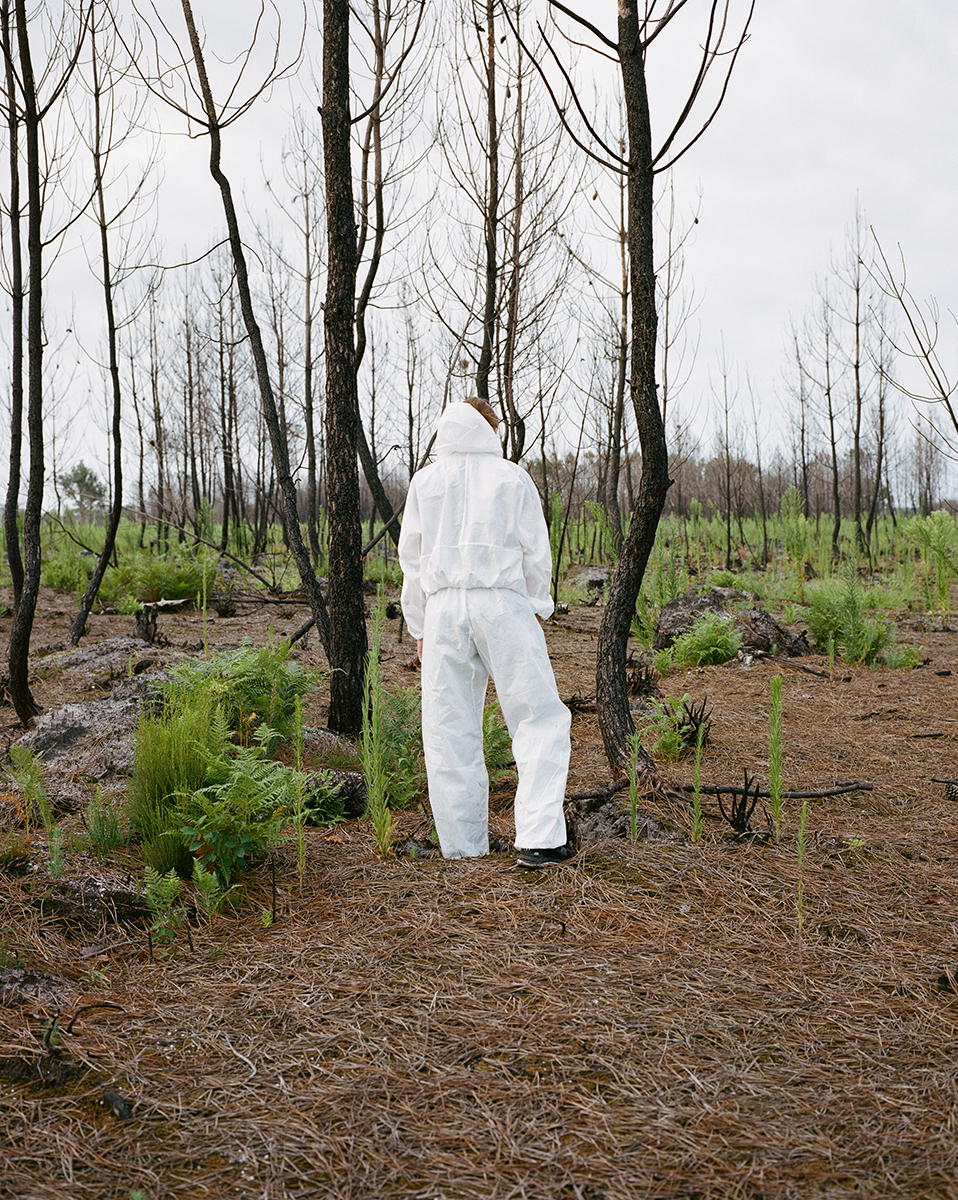We blaze in the flare that blinds us
year:
2023
Featured in DISC Journal issue 3.0 “Enchantment”.
Drawing from Ursula LeGuin’s poem Kinship, this visual essay narrates a techno-scientific ritual navigating amongst the remains of a pine forest burnt during wildfires in the Southwest of France. As an investigation into a damaged territory, the ritual explores new narrative forms that merge post-catastrophic with pre-utopian lenses to valorize adaptation and worldings.
Documented through various media in order to reveal precise evidence of climatic upheavals in Europe, it is simultaneously an investigation into the real and the fictional; the alive and the dead, as ever-continuous entities. From the lively shimmer of the flowering grass to the dying bark of the pine body, the visual essay acts as a storyteller for this meandering ritual.
The 2022 forest fires affected three different areas of the Landes Natural Regional Park between mid-July and the end of September. They required the intervention of several hundred firefighters from Aquitaine, and help from neighboring European countries to tame the flames. The region had received only limited rainfall since August 2021. This deficit encouraged forest droughts, which, combined with the West European heatwave of July 2022 – persistent drought and stormy winds – left the region highly exposed to the risk of wildfires.
Before the systematic forestation of the marshes of the Landes de Gascogne in the mid-19th century, the region's economy was based on an agro-pastoral system with ubiquitous sheep herds used to fertilize the sandy soils. As the industrial era unfolded, the need to fix the sand dunes, drain and reclaim the plains drove out the Landes shepherds and their herds, as pines were planted on a large scale. Today, the monoculture of maritime pines make up 90% of the Natural Park area.
location:
Landes Natural Regional Park, Franceteam:
Alice Loumeauyear:
2023commissioner:
self-initiatedFeatured in DISC Journal issue 3.0 “Enchantment”.
Drawing from Ursula LeGuin’s poem Kinship, this visual essay narrates a techno-scientific ritual navigating amongst the remains of a pine forest burnt during wildfires in the Southwest of France. As an investigation into a damaged territory, the ritual explores new narrative forms that merge post-catastrophic with pre-utopian lenses to valorize adaptation and worldings.
Documented through various media in order to reveal precise evidence of climatic upheavals in Europe, it is simultaneously an investigation into the real and the fictional; the alive and the dead, as ever-continuous entities. From the lively shimmer of the flowering grass to the dying bark of the pine body, the visual essay acts as a storyteller for this meandering ritual.
The 2022 forest fires affected three different areas of the Landes Natural Regional Park between mid-July and the end of September. They required the intervention of several hundred firefighters from Aquitaine, and help from neighboring European countries to tame the flames. The region had received only limited rainfall since August 2021. This deficit encouraged forest droughts, which, combined with the West European heatwave of July 2022 – persistent drought and stormy winds – left the region highly exposed to the risk of wildfires.
Before the systematic forestation of the marshes of the Landes de Gascogne in the mid-19th century, the region's economy was based on an agro-pastoral system with ubiquitous sheep herds used to fertilize the sandy soils. As the industrial era unfolded, the need to fix the sand dunes, drain and reclaim the plains drove out the Landes shepherds and their herds, as pines were planted on a large scale. Today, the monoculture of maritime pines make up 90% of the Natural Park area.



 credit: The great Landes forest fire of 1949
credit: The great Landes forest fire of 1949